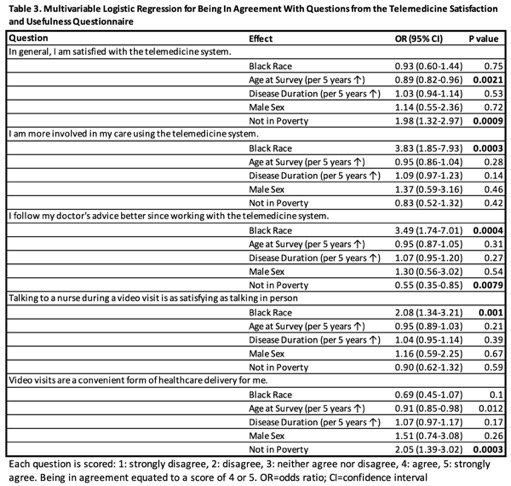Session Information
Date: Tuesday, November 9, 2021
Title: Patient Outcomes, Preferences, & Attitudes Poster IV: COVID-19 (1589–1613)
Session Type: Poster Session D
Session Time: 8:30AM-10:30AM
Background/Purpose: The COVID-19 pandemic resulted in the shift from in-person physician appointments to the development and proliferation of the use of telemedicine in an attempt to give comparable levels of care despite social distancing and travel restrictions. It is unclear how patients with SLE, particularly from minority communities, used and perceived telemedicine during this time.
Methods: Georgians Organized Against Lupus (GOAL) is a population-based cohort of adult, validated SLE patients in Atlanta. GOAL participants were surveyed by internet, mail, and/or phone from January 19, 2021 through March 25, 2021. Survey questions covered sociodemographics and use and perceptions of telemedicine during the COVID-19 pandemic. Frequency of responses were reported overall and by sex, race, age group, and work status. Differences within groups were evaluated using t-tests and P-values. The 21-item Telemedicine Satisfaction and Usefulness Questionnaire (TSUQ) measures usefulness, effectiveness, ease of use, attitude, intention to use, and compares telemedicine to in-person visits. Each question uses a 5-point Likert scale that ranges from 1 (strongly disagree) to 5 (strongly agree). Being in agreement equated to a score of 4 or 5. Questions that showed significance in univariable analysis by race, age at survey, disease duration, sex, and poverty status were evaluated by multivariable logistic regression.
Results: A total of 732 participants had an average age of 51.4 years with a disease duration of 18.2 years (Table 1). Most were female (93.3%) and self-identified as Black (78.1%) with 26.8% living at or below the Federal poverty level. Although 40.3% were employed, 36.5% were unemployed and 23.3% were off the work force (disabled, retired, student, homemaker). Black participants were more frequently in poverty (32.1 vs. 8.3%) and less likely employed. The youngest age group (18-34) lived in poverty most frequently and the oldest (55+) was the least employed. A total of 74% of respondents had a telemedicine visit during the pandemic with 90% having an adequate internet connection (Table 2). Most connected from home. There were no differences by race, age group, and work status. Smartphones with cameras were used more often by Blacks and younger participants Laptops were also used more frequently by younger and employed individuals. There were no significant differences between males and females in any category (Tables 1 and 2). Multivariable logistic regression (Table 3) showed that Blacks were more involved in their care, followed their doctor’s advice better, and more satisfied with talking to a nurse. Not being in poverty was associated with being satisfied with telemedicine and finding video visits as convenient. However, those in poverty followed their doctor’s advice better. Younger age was associated with higher satisfaction with telemedicine.
Conclusion: In this diverse SLE cohort, telemedicine was widely used during the pandemic. Blacks felt more involved in their care, and Blacks and those in poverty followed their doctor’s advice better using telemedicine. Telemedicine may potentially offer an opportunity to mitigate health disparities through the pandemic and beyond.
To cite this abstract in AMA style:
Simmons S, Drenkard C, Bao G, Dunlop-Thomas C, Schofield K, Lim S. A Population-Based Evaluation of Telemedicine Use and Satisfaction in SLE Patients During the COVID-19 Pandemic in Atlanta, Georgia [abstract]. Arthritis Rheumatol. 2021; 73 (suppl 9). https://acrabstracts.org/abstract/a-population-based-evaluation-of-telemedicine-use-and-satisfaction-in-sle-patients-during-the-covid-19-pandemic-in-atlanta-georgia/. Accessed .« Back to ACR Convergence 2021
ACR Meeting Abstracts - https://acrabstracts.org/abstract/a-population-based-evaluation-of-telemedicine-use-and-satisfaction-in-sle-patients-during-the-covid-19-pandemic-in-atlanta-georgia/



